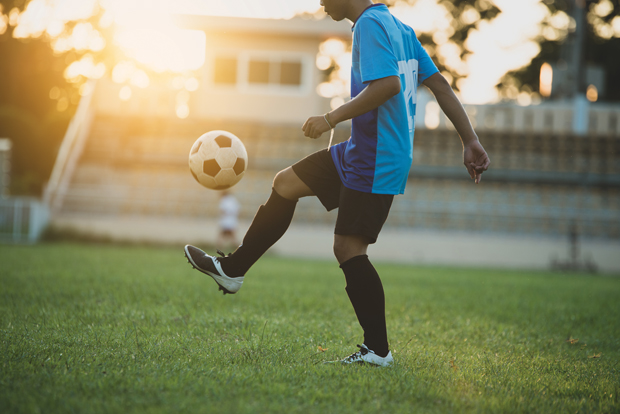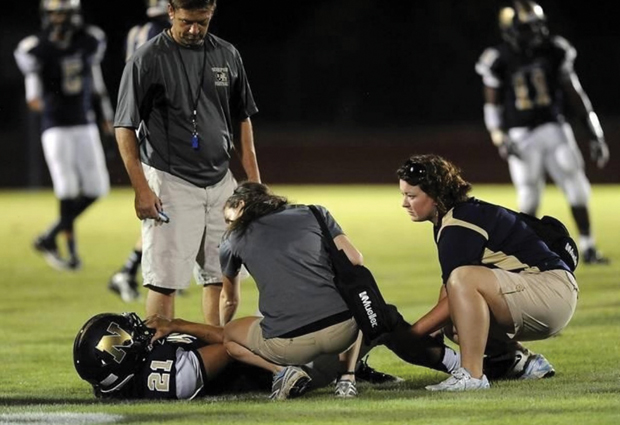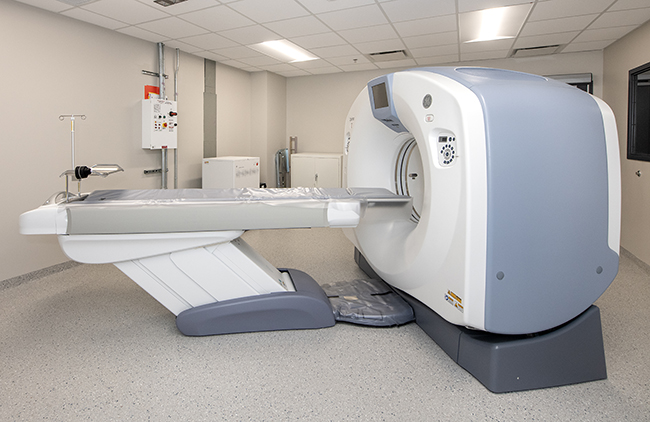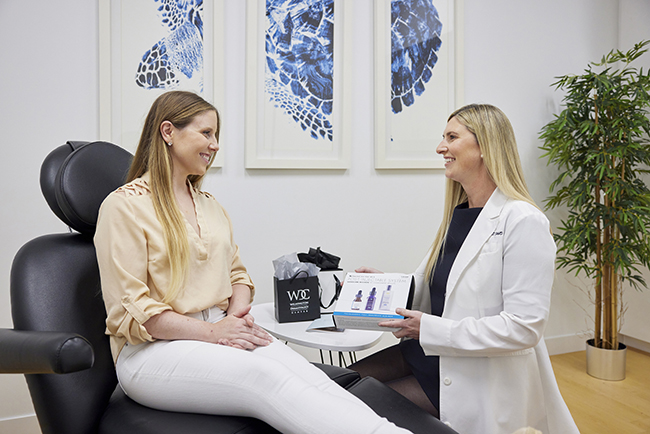Put Me In Coach, I’m Ready to Play
03 Sep 2019
The rundown on sports medicine
By CAROLINE GOBBLE

It’s fall, which means it is time for students to head back to school, and it’s time for football and other sports seasons to begin. From concussions to sprains to fractures, sports injuries are bound to happen, so it is important to know what to do and who can help when they occur. Sports medicine “deals with the prevention, diagnosis, management and rehabilitation of injuries related to sports, exercise or recreational activities,” according to the American Medical Society for Sports Medicine. “Sports medicine doctors are non-surgical primary care physicians or orthopedic surgeons who specialize in musculoskeletal injuries, asthma, hypertension, and diabetes in athletes as well as active but non-athletic persons including students at any level,” explains the AMSSM.
Dr. Chad Fortun of Carolina Sports Medicine & Orthopaedic Specialists says, “Sports medicine is the central aspect of health care as it pertains to the athlete. Sports medicine involves a cohesive group of medical professionals working together towards a uniform goal. That goal is, first and foremost, to prevent injuries and when injuries ultimately occur, provide prompt and appropriate treatment returning the athlete back to their pre-injury form as quickly as possible. As sports medicine providers, we strive to provide the ultimate in accessibility and seamless communication between our medical team and the coaching staff.”
According to the National Safety Council (NSC), a 2017 survey found that exercise and the use of exercise equipment had the highest number out of about 25 different sports and activities with more than 526,000 injuries reported. “Basketball followed with about 500,000 injuries, while bicycling, with 457,000 injuries and football, with 341,000 injuries, ranked third and fourth,” explains the Insurance Information Institute. The Centers for Disease Control and Prevention reports that in 2013, an estimated 329,290 children (age 19 or younger) were treated in U.S. emergency departments for sports and recreation-related injuries that included a diagnosis of concussion or traumatic brain injury.
According to the Brain Injury Research Institute, an estimated 1.6 to 3.8 million athletes annually suffer from concussions, and a study by the American Academy of Pediatrics found that the number of sports-related concussions is highest in high school athletes, however, they are on the rise among younger athletes.
The numbers show that sports-related injuries are prevalent and are increasing each year among athletes and non-athletes alike. So, when is it important to seek care for a sports injury? Duke Health Sports Medicine recommends doing so when one experiences a bone fracture or orthopedic trauma, a Ligament or tendon tear, a dislocation, or a sprain, strain, or pain from an injury that has not improved in 48 hours.
“Most injuries are due to overuse phenomena that can be treated frequently without surgery,” explains Dr. Dale Boyd Jr. of Cape Fear Sports Medicine. “Education and injury prevention programs are paramount. Understanding the biomechanics of the specific sport allows insight to effect treatment. Having been a Division 1 college athlete, as well as both of my children being Division 1 college athletes, helps give me a unique perspective,” says Boyd. Boyd’s interest in sports medicine stemmed from injuries that occurred during his college-wrestling career.

Also having personal experiences that fueled a career in sports medicine, Fortun explains, “I vividly remember that feeling of despair after various sporting injuries, some involving surgery and some with quick returns to the field. I appreciate and admire my healthcare team that returned me to action. Combine that with a love of science, anatomy and the ability to be challenged physically and mentally is what lead me to where I am today. Working with patients that have the drive, desire and skill to get back in the game is very rewarding.”
Scientific principles derived from sports medicine research can be applied to all individuals to yield excellent outcomes and allow one return to a high level of participation whether you’re an elite athlete, weekend warrior, recreational adult athlete or an industrial athlete. Athletes of all skill levels can benefit from sports medicine treatments whether operative, non-operative or prevention based. “Sports Medicine from an operative stand point is constantly evolving. Advances in biological solutions for treatment as well as minimally invasive techniques have made it the envy of all other specialties,” explains Boyd.
Editor-in-chief of Sports Health, writes “Maybe one of the strongest arguments for regular exercise at any age is the maintenance of bone health.” In considering the prevention of sports injuries, he states, “No doubt the surveillance of exercise routines, attention to symptoms, physical signs, and nutritional guidance are essential to the development of healthy athletic profiles, but for those participating in many rigorous contact sports, protective equipment can play an integral part in injury prevention.” Footwear, often viewed a cosmetic feature, can play a key role in helping prevent injuries and should be carefully considered when one participates in sports or exercise.
Education is also an integral part of preventing sports related injuries. SportsMedToday.com is a useful resource and provides facts sheets for specific sports, and it also discusses common sports related injuries for various body parts. AMSSM Sports has an extensive list of Medcasts, which are podcasts on a variety of topics ranging everywhere from injury prevention and education to concussion evaluation and management and feature doctors and experts from all around the world.
Wilmington has a vast amount of sports medicine doctors and orthopaedic surgeons including Cape Fear Sports Medicine (see side bar), Carolina Sports Medicine & Orthopaedic Specialists (see side bar), Emergeortho, Bowling Orthopaedics, Carolina Care, Cape Fear Sports Enhancements, and Port City Orthopaedics.
“The sports medicine team has your best interest in mind. Do not be afraid to discuss your injuries with your health care team. Our goal is your goal, which is to get you back on the field as safely and as quickly as possible,” explains Fortun. “We are here to help and can often prevent and rehab injuries without the need for surgery or prolonged absence from your sport.” Stay safe on and off the field this fall.
“At Carolina Sports Medicine, we consider ourselves the ultimate in sports medicine practitioners. Combining top-notch skills with world-class education and training, allowing us to provide the best in sports medicine care. We pride ourselves in easy access and constant communication with the health care team. Prior to becoming an orthopaedic surgeon I worked as a physical therapist. This provides me with a unique perspective and skill in treating injuries from a rehab standpoint and also with surgery when necessary. Additionally, I have a special interest in minimally invasive treatment of athletic hip pain and non-arthritic hip disorders. As the only fellowship trained hip arthroscopist in the area I see patients from all over with special hip needs.” - Dr. Chad Fortun
Carolina Sports Medicine & Orthopaedic Specialists
1717 Shipyard Blvd., Suite 350
Wilmington, NC 28403
910-799-0110
carolinasportsmed.com
“Communication with parents, coaches and certified athletic trainers is important to be an effective sports medicine orthopaedic surgeon. My practice is set up with that in mind and is a comfortable environment with an emphasis on timely evaluation with patient-focused care. We have a Physical Therapy facility and a Performance Enhancement facility all onsite. Other practice highlights at Cape Fear Sport Medicine include a registered sports medicine dietician and a Saturday sports injury clinic. My building was both architecturally and interior designed specifically for my practice.” - Dr. Dale W. Boyd Jr.
Cape Fear Sports Medicine
6019 Oleander Drive, Suite 200
Wilmington, NC 28403
910-790-9714
capefearsportsmedicine.com














